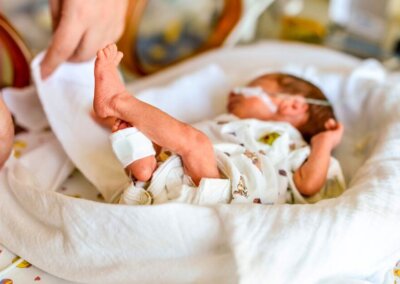Two off-duty British nurses helped deliver an extremely premature baby mid-flight after his mother went into labour on a flight to the Philippines.
The woman, called Sheryl, started having contractions shortly after the flight took off. She initially thought it was a false alarm but was shocked to see the baby’s head.
Fortunately for her, two nurses from Staffordshire, Ruel Pascua and his wife, also called Sheryl, happened to be on the same flight and stepped in to help after the cabin crew called for medical assistance.
Mrs Pascua, who works in care for NG Healthcare in Trentham, told the BBC how nervous she was because she had not delivered a baby for four years. After carrying out an internal examination, she discovered that the baby was crowning and “could see hair”.
Cabin staff erected a tent around the woman, also named Sheryl, while the nurses tended to her on 2 August, the Stoke Sentinel reported.
They still had nine hours before they landed
The baby was born within minutes and was given some oxygen, but really needed an incubator, but it was nine hours before the flight would reach its destination. Fortunately though, Sheryl’s son was taken to a hospital shortly after they landed and has since recovered.
Mrs Pascua described the experience: “I was on top of her with my knees between her legs… all I can remember was it was so quick”, she said.
“My husband is already behind me with his gloves, ready to catch the baby”, she said.
“Can you imagine the size of the baby? It’s the palm of my husband”.
“Everybody on board was praying and I could see the unity and the team work of the cabin crews, us nurses and the Filipino community on board, so we help each other”, she said.
“For me and my husband, when help is needed we are always there and people know this of us,” she added.
The chances for prematurely born babies are improving all the time
Earlier this year, John Wyatt, Professor of Ethics and Perinatology at University College London and also Emeritus Professor of Neonatal Paediatrics, Ethics & Perinatology at University College London, presented evidence to parliamentarians from the UK and across the world showing “that there has been a steady improvement in the chances of survival of babies born at 22 and 23 weeks gestation since the Abortion Act was last amended [in 1990]”.
Right To Life UK spokesperson, Catherine Robinson, said: “Sheryl must be so grateful for the help of these nurses without whom their son might not be here”.
“Prematurely born babies are a constant challenge to supporters of abortion since our culture does everything in its power to help babies born so early and yet, at the same time, babies at the same gestational age can have their lives ended by abortion”.












